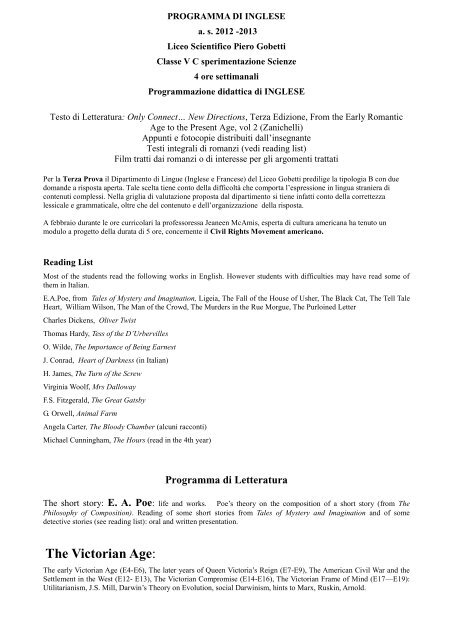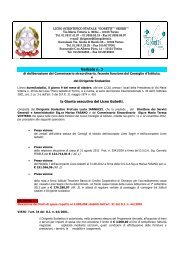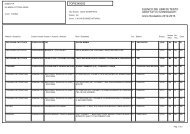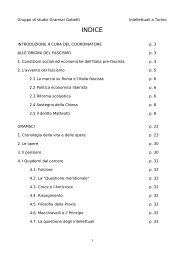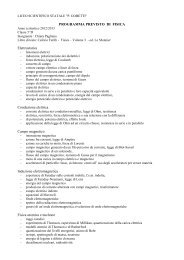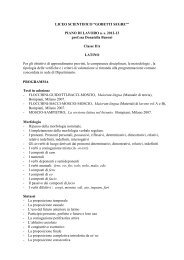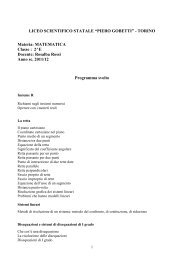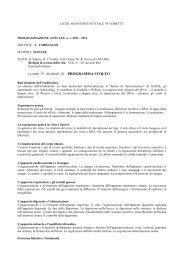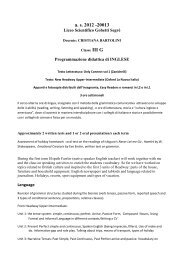The Victorian Age: - Liceo scientifico statale Gobetti-Segrè - Torino
The Victorian Age: - Liceo scientifico statale Gobetti-Segrè - Torino
The Victorian Age: - Liceo scientifico statale Gobetti-Segrè - Torino
You also want an ePaper? Increase the reach of your titles
YUMPU automatically turns print PDFs into web optimized ePapers that Google loves.
PROGRAMMA DI INGLESE<br />
a. s. 2012 -2013<br />
<strong>Liceo</strong> Scientifico Piero <strong>Gobetti</strong><br />
Classe V C sperimentazione Scienze<br />
4 ore settimanali<br />
Programmazione didattica di INGLESE<br />
Testo di Letteratura: Only Connect… New Directions, Terza Edizione, From the Early Romantic<br />
<strong>Age</strong> to the Present <strong>Age</strong>, vol 2 (Zanichelli)<br />
Appunti e fotocopie distribuiti dall’insegnante<br />
Testi integrali di romanzi (vedi reading list)<br />
Film tratti dai romanzi o di interesse per gli argomenti trattati<br />
Per la Terza Prova il Dipartimento di Lingue (Inglese e Francese) del <strong>Liceo</strong> <strong>Gobetti</strong> predilige la tipologia B con due<br />
domande a risposta aperta. Tale scelta tiene conto della difficoltà che comporta l’espressione in lingua straniera di<br />
contenuti complessi. Nella griglia di valutazione proposta dal dipartimento si tiene infatti conto della correttezza<br />
lessicale e grammaticale, oltre che del contenuto e dell’organizzazione della risposta.<br />
A febbraio durante le ore curricolari la professoressa Jeaneen McAmis, esperta di cultura americana ha tenuto un<br />
modulo a progetto della durata di 5 ore, concernente il Civil Rights Movement americano.<br />
Reading List<br />
Most of the students read the following works in English. However students with difficulties may have read some of<br />
them in Italian.<br />
E.A.Poe, from Tales of Mystery and Imagination, Ligeia, <strong>The</strong> Fall of the House of Usher, <strong>The</strong> Black Cat, <strong>The</strong> Tell Tale<br />
Heart, William Wilson, <strong>The</strong> Man of the Crowd, <strong>The</strong> Murders in the Rue Morgue, <strong>The</strong> Purloined Letter<br />
Charles Dickens, Oliver Twist<br />
Thomas Hardy, Tess of the D’Urbervilles<br />
O. Wilde, <strong>The</strong> Importance of Being Earnest<br />
J. Conrad, Heart of Darkness (in Italian)<br />
H. James, <strong>The</strong> Turn of the Screw<br />
Virginia Woolf, Mrs Dalloway<br />
F.S. Fitzgerald, <strong>The</strong> Great Gatsby<br />
G. Orwell, Animal Farm<br />
Angela Carter, <strong>The</strong> Bloody Chamber (alcuni racconti)<br />
Michael Cunningham, <strong>The</strong> Hours (read in the 4th year)<br />
Programma di Letteratura<br />
<strong>The</strong> short story: E. A. Poe: life and works. Poe’s theory on the composition of a short story (from <strong>The</strong><br />
Philosophy of Composition). Reading of some short stories from Tales of Mystery and Imagination and of some<br />
detective stories (see reading list): oral and written presentation.<br />
<strong>The</strong> <strong>Victorian</strong> <strong>Age</strong>:<br />
<strong>The</strong> early <strong>Victorian</strong> <strong>Age</strong> (E4-E6), <strong>The</strong> later years of Queen Victoria’s Reign (E7-E9), <strong>The</strong> American Civil War and the<br />
Settlement in the West (E12- E13), <strong>The</strong> <strong>Victorian</strong> Compromise (E14-E16), <strong>The</strong> <strong>Victorian</strong> Frame of Mind (E17—E19):<br />
Utilitarianism, J.S. Mill, Darwin’s <strong>The</strong>ory on Evolution, social Darwinism, hints to Marx, Ruskin, Arnold.
<strong>The</strong> <strong>Victorian</strong> Novel (E20-21) Types of Novel (E22-23), Aestheticism and Decadence (E3132).<br />
Charles Dickens: life and works, characterization, didactic aim of his novels. style (flat vs round characters,<br />
omniscient narrator, linear time, stereotyped plot, happy ending), E37-E40.<br />
Oliver Twist, reading and written text analysis of the novel, vision of the film Oliver directed by Roman Polansky<br />
(2005).<br />
Thomas Hardy: life and works, Hardy’s deterministic view, the Wessex, main themes of his novels, style,<br />
omniscient intrusive narrator (E74-E81).<br />
Tess of the D’Urbevilles, reading and written text analysis of the novel.<br />
Revision of Nathaniel Hawthorne’s <strong>The</strong> Scarlet Letter (text read in the third year). Sentimental novel, historical novel,<br />
the American Renaissance (E131-132).<br />
Oscar Wilde and the Aesthetic Movement: life and works, the rebel and the dandy, Art for Art’s Sake (E110-<br />
E111).<br />
<strong>The</strong> Picture of Dorian Gray: detailed comment of “<strong>The</strong> Preface” to <strong>The</strong> Picture of Dorian Gray (E114) and the<br />
principles of the Aesthetic Movement. Plot, narrative technique, allegorical meaning (E112).<br />
Wilde’s <strong>The</strong>atre: Brilliant comedies, full reading of <strong>The</strong> Importance of Being Earnest, comment on the anthology<br />
excerpts E124-125. Focus on the use of paradox and nonsense, criticism to moralism and classism in <strong>Victorian</strong> society.<br />
Vision of the film <strong>The</strong> Importance of Being Earnest in L2 (starring Rupert Everett, Colin Firth, Judy Dench).<br />
Analysis of two novelists leading to Modernism: Conrad e James.<br />
Chronological time vs time as perception: hints to Freud, Bergson (time as ―durée‖) and to William James (stream of<br />
consciousness), psychological insight in the characters, flashback and the technique of the point of view.<br />
Henry James: life and works and the psychological novel, the international theme, the internal focalization.<br />
Hints to Portrait of a Lady in relation to the international theme.<br />
Vision of the film in L2, Portrait of a Lady directed by Jane Campion.<br />
Reading of the psychological novel <strong>The</strong> Turn of the Screw, the frame structure, the internal focalization, paranoia and<br />
allucination or ghost story<br />
Joseph Conrad, life and works, Conrad’s oblique style, the individual consciousness, the technique of the point<br />
of view and of flashback (F83-F86).<br />
Heart of Darkness: full reading, written text analysis, different levels of interpretation, Conrad’s vision of colonialism.<br />
Vision of the film in L2 Apocalypse Now, directed by F. F. Coppola.<br />
<strong>The</strong> Modern <strong>Age</strong>:<br />
Historical Context: World War I, the Edwardian <strong>Age</strong> (F4-F5), Britain and World War I (F6-F7)<br />
<strong>The</strong> Twenties and the Thirties (F8), <strong>The</strong> Second World War (F9).<br />
Vision of the film Land and Freedom directed by ken Loach on the Spanish Civil War.<br />
<strong>The</strong> United States between Two Wars (F10-F11), <strong>The</strong> Great Depression of the 1930s in the USA (F12).<br />
Vision of the film Modern Times directed and interpreted by Charlie Chaplin.<br />
<strong>The</strong> <strong>Age</strong> of Anxiety (F14-16).<br />
Modernism (F17-18).<br />
New trends in British poetry at the beginning of the XX century: Imagist Movement, Imagism. Symbolism and Free<br />
Verse (F19-20)<br />
Examples of Imagist poetry (Ezra Pound, In a Station of the Metro William Carlos Williams, This is just to say),<br />
(F21)<br />
War Poets: W. Owen, Dulce et Decorum Est (F46)<br />
Modernist Poetry
Thomas Stearns Eliot: life and works. <strong>The</strong> mythical method and the objective correlative in <strong>The</strong> Waste Land<br />
(F52-F55)<br />
From <strong>The</strong> Waste Land, extract from ―<strong>The</strong> Burial of the Dead‖ (F57), ―A Game of Chess‖ (photocopy), ―<strong>The</strong> Fire<br />
Sermon‖ (F59-60) – translation, analysis and comment.<br />
Modernism and the novel:<br />
<strong>The</strong> Stream of Consciousness Technique (F22-23), <strong>The</strong> interior monologue (F24-26)<br />
Virginia Woolf: life, works, the Bloomsbury Group, Woolf vs Joyce, her narrative technique (F157-158)<br />
Full reading and analysis of Mrs Dalloway (free indirect speech, the technique of the point of view, moments of being),<br />
comment on the book: F159-160<br />
Vision of the film in L2 Mrs Dalloway (starring Vanessa Redgrave) - if we have time<br />
Vision of the film in L2 <strong>The</strong> Hours from the novel by M. Cunningham (read in the 4 rd year)<br />
James Joyce: life and works. Epiphany and interior monologue (F138-139)<br />
Dubliners, the use of epiphany, paralysis, narrative technique (F141-142). Reading of Eveline (F143-146),<br />
and from Ulysses, an example of interior monologue (E155) ―I said yes I will sermon‖<br />
<strong>The</strong> Lost Generation of American Writers<br />
<strong>The</strong> Jazz <strong>Age</strong>, the end of the American Dream. A new generation of American Writers (F28-29)<br />
Francis Scott Fitzgerald, life and works (F212)<br />
<strong>The</strong> Great Gatsby, full reading, analysis of the narrative technique, characters, point of view, New York vs the Midwest<br />
and comment (F 213-14)<br />
Vision of the film in L2 <strong>The</strong> Great Gatsby, screenplay by F.F. Coppola<br />
Utopian and Dystopian Novel: general characteristics and evolution of the genre through the centuries<br />
(hints to Aldous Huxley, Ray Bradbury Fahrenheit 451 read in the 3 rd year)<br />
George Orwell, life and works (F189-190)<br />
Full reading of Animal Farm, analysis of the characters, historical background (F191)<br />
Vision of the film Metropolis, directed by Fritz Lang, and Bladerunner, directed by Ridley Scott<br />
<strong>The</strong> Present <strong>Age</strong> (1945- 2001)<br />
WWII and the Post War Period (historical presentation: the welfare state, paths to freedom, the Thacher years, from<br />
Blair to present day) (G2-10)<br />
<strong>The</strong> USA after WWII (G11-13) <strong>The</strong> American Civil Rights Movement (modules of 5 hours with an American<br />
Expert), Martin Luther King and Malcolm X (vision of the homonymous film directed by Spike Lee)<br />
<strong>The</strong> Cultural Revolution (G14-16)<br />
General Overview of the literary prose production in the 2 nd half of the XX century (<strong>The</strong> contemporary novel, G23)<br />
<strong>The</strong> <strong>The</strong>atre of the Absurd<br />
Samuel Beckett: life and works (G100)<br />
Waiting for Godot (G101-102), plot, absence of traditional structure, symmetry, the meaninglessness of time, the comic<br />
and the tragic
Prose production in a gender perspective: Angela Carter, from <strong>The</strong> Bloody Chamber ―Werewolf‖, ―Wolf Alice‖,<br />
―<strong>The</strong> Company of Wolves‖<br />
Revision of the novel read in the 4 th year <strong>The</strong> Hours by Michael Cunningham<br />
La professoressa I rappresentanti di Classe


